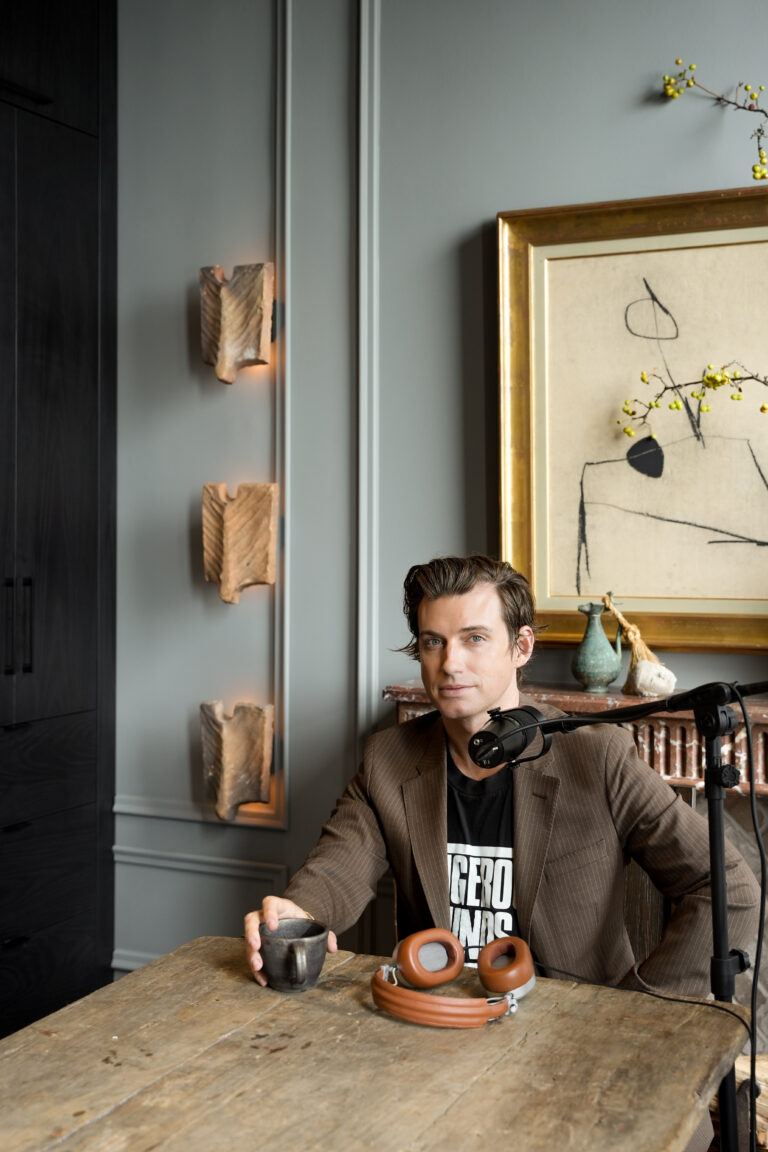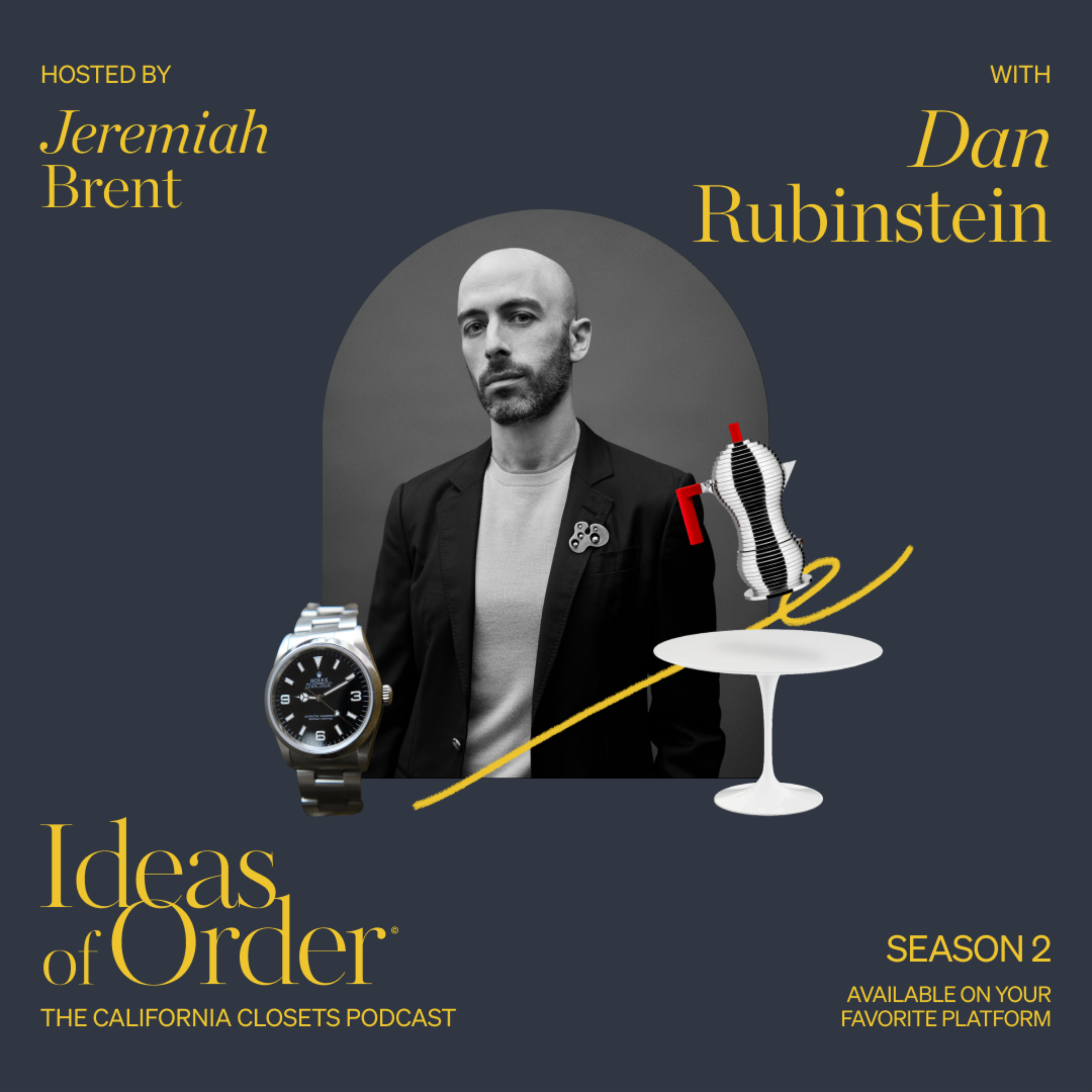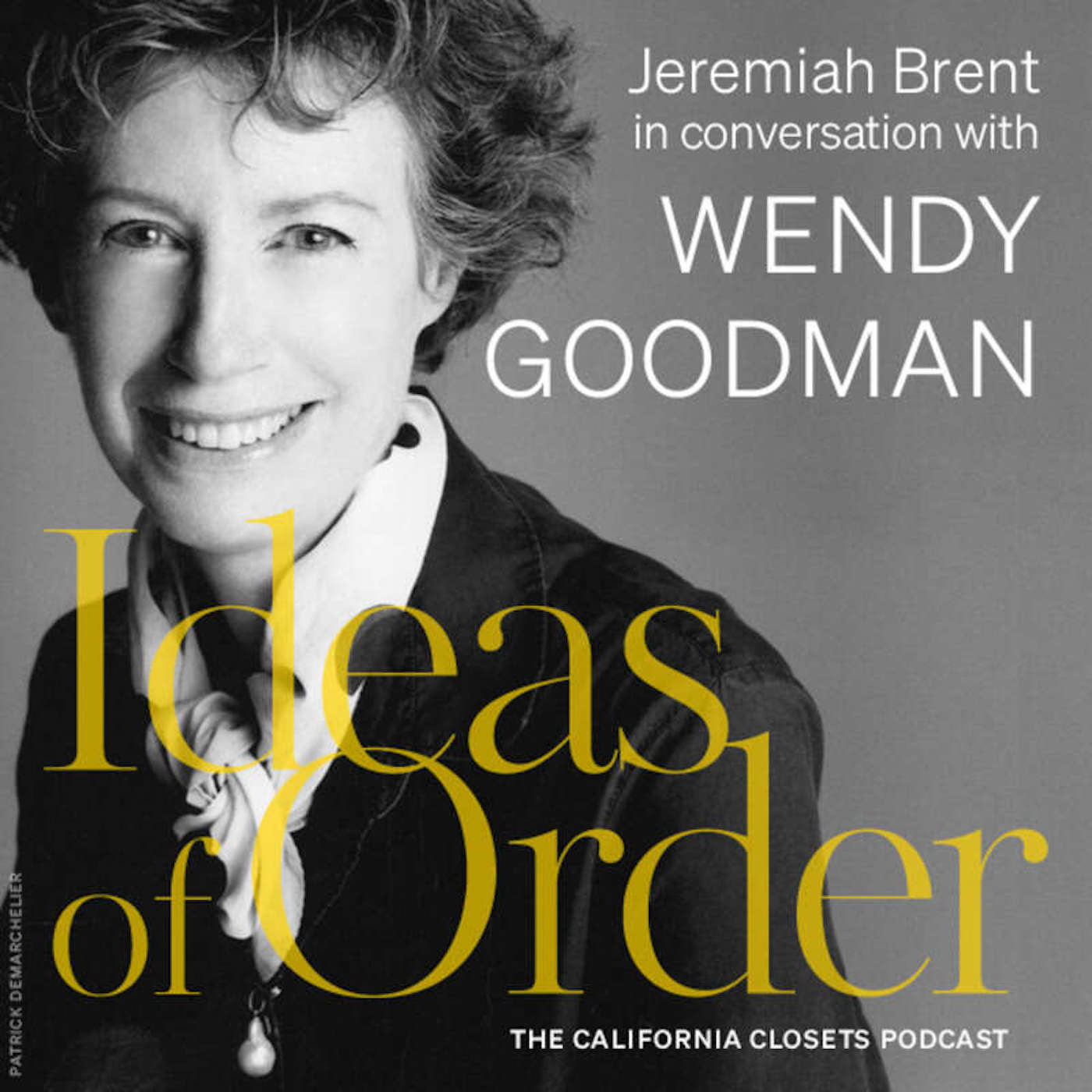Bobbi Brown, known for revolutionizing the beauty industry, discusses her journey into the world of cosmetics, sharing the inspirations and experiences that have shaped her life philosophy, and all the ways it relates to home. Listen in for a unique perspective on the art of natural beauty with Bobbi and Jeremiah.
Ideas of Order, the California Closets podcast, is produced by Rob Schulte at SANDOW DESIGN GROUP and is part of the SURROUND Podcast Network. Discover more shows from SURROUND at surroundpodcasts.com.
Follow Ideas of order on Instagram @IdeasOfOrderCaliforniaClosets
This transcript was generated by an automated service. In some cases it may be incomplete or inaccurate due to inaudible passages or transcription errors.
Bobbi: [00:00:00] I didn’t like going to college. It was so boring for me. And my mother said, you have to finish. And I said, but mom, I don’t know what I want to do. She said, forget what you want to do. Forget how you’re going to make money. If it was your birthday and I had a magic wand, if you do anything you want in the world, what would you want to do?
And I’d never said this before. And I said, I’d like to go to Marshall Fields and play with makeup.
Jeremiah: Welcome to Ideas of Order, a podcast dedicated to answering the question, what does home mean to you? I’m Jeremiah Brent. Today’s guest is a household name around the world, one that is synonymous with beauty, wellness, and the utmost quality. She’s the founder of the internationally renowned makeup and skincare institution, Bobby Brown Cosmetics, and more recently, Jones Road Beauty.
There are few others who have earned the trust of enthusiasts and professionals quite like her. A master of reinvention, ingenuity, and persistence, Bobby Brown.
Are you a type A, like, organized personality? You are?
Bobbi: I’m such a visual everything that, you know, I’ve spent my life as a young makeup artist on shoots and I used to do people’s makeup for home shoots, you know, now I’m in the shoot. So I spent, I understand what it has to look like for a shoot, but my house never looks like that.
So it drives me crazy. The cobbler with bad shoes. Yeah, for sure. But no, I just, I like being a minimalist. But
Jeremiah: are you a minimalist?
Bobbi: I’m working on it. I’m a minimalist, but I always think something could be better, right? I always, I still think I’m going to find the perfect Navy pants. I’m hopeful for you.
Yeah.
Jeremiah: Well, can I ask then, you know, speaking to kind of coming from Chicago, you know, growing up there, leaving at 17, what was the earliest space that you remember loving as a young girl? You know, you’re so focused on the [00:02:00] spaces around you and you curate everything around you. Was there a space that you really remember first as child?
Bobbi: Well, certainly it’s my grandmother’s house because my grandmother, who I called Nana, first of all, she only liked green. It was the. Most multi greenhouse you’ve ever seen in your life, but it was her favorite. But I just, for me, it’s like places about memories. I felt loved. I felt safe. I felt tall. I’m five foot tall and I was tall next to her and she just used to always tell me, you make the best tea in the whole world and you’re my favorite.
I know she told her others that too, but I know I was, but I just felt loved and safe.
Jeremiah: That’s so interesting. And you felt that in her space, in
Bobbi: her space. And, you know, my homes growing up were interesting and modern for the time, you know, they had red shag carpeting on the walls and astroturf in the backyard and, you know, the suburbs of Chicago.
You know, I don’t remember anything that, you know, I would necessarily want to bring into my home today.
Jeremiah: It’s interesting. Who is into design with your parent and your, between your
Bobbi: parents? I think both of them, you know, they were 20 when I was born, they were very young and I was born at 67. So, you know, the sixties and the seventies were a very interesting time and, you know, they were trying to figure out who they were and, you know, they were all of a sudden like the cool kids and, you know, the good looking kids and, you know, they just kind of had this amazing life with all their friends.
I was the oldest kid, so I really got to observe a lot and, you know, I became kind of. You know, the mother of the, of the group at some point.
Jeremiah: Wow. Were they intentional about their design and the way they lived?
Bobbi: I don’t know if they were intentional. I mean, I grew up not realizing it was cool with an Ames chair, like, you know, is it Ames or Eames?
Eames. Whatever it is. Yeah. Yeah. Which, you know, is one of my favorite [00:04:00] pieces that I have in my house. And that’s the other thing I hope to, you know, give all my kids because I think it’s such a great like chair centerpiece. So I don’t know, you know, probably wasn’t the coolest, but it was just of the moment.
Jeremiah: Yeah. Do you think it influenced your style, like as an adult?
Bobbi: Um, I don’t think so, because it took me a while to realize why I was so smitten on this chair. I kind of forgot. That it was the one that my, um, my dad used to sit at. And I remember my, my Nana, my favorite human used to crochet these, um, these blankets, which I actually have.
My father gave it to me, but it used to sit over this chair. And even now when I’m feeling vulnerable or I need something, I’ll take this blanket out of my closet and put it on me. And it just kind of makes me feel like Nana made me feel safe and
Jeremiah: loved. I had, my grandmother was like four, eight, I swear.
And she was mean and Portuguese, but she loved me. Um, and she was so tough. She was a terrible mother, but she was a great grandmother to me. And I remember her house. It was the most impactful place still to this day, because it was like one of those places where you walked in and it really was this physical manifestation of how not only she saw herself, but also like how she wanted to be portrayed.
And it really stuck with me. It was not beautiful. It was not anything other than just deeply personal. Yeah, things she loved. Exactly. And that’s kind of the impetus around this podcast and, you know, kind of reframing these ideas of beauty, um, and what it means to people and where it started. You had mentioned that you were in Chicago and then you left at 17.
I
Bobbi: went to Boston for
Jeremiah: college. How is
Bobbi: Boston? It was my third college. I first went to Wisconsin for six months, then Arizona for a year, and then Boston. So when I finally found Emerson College in Boston is when I found myself because I found a [00:06:00] college that let me study and major in theatrical makeup. So I have a, I’m probably one of the only people I know that has a college degree in makeup that I, by the way, made up myself the entire major.
You’re kidding.
Jeremiah: What made you want to get into it?
Bobbi: Well, I, after my first two colleges and I didn’t like going to college, it was so boring for me and my mother said, you have to finish. And I said, but mom, I don’t know what I want to do. She said, forget what you want to do. Forget how you’re going to make money.
If it was your birthday and I had a magic wand, you could do anything you want in the world, what would you want to do? And I’d never said this before. And I said, I’d like to go to Marshall fields and play with makeup. And she said, why don’t you be a makeup artist? And I said, I don’t want to go to beauty school.
She said, no, I’m sure there’s a college somewhere. There wasn’t, but I found Emerson that allowed me to pursue my dreams.
Jeremiah: That’s insane. Well, that’s also a magical thing for a parent to say to somebody. I would never think to like, what, if you could just pick what you want to do, what would it
Bobbi: be? Right. You know, I don’t know if I was a, a guy, they would have said that they would have been like, what are you, how are you going to make money?
How are you going to support a family? But back then, you know, they never, my parents never really thought I would. necessarily amount to anything except, you know, being a nice, good person. They just, you know, didn’t think that I had what it took to go to law school, put it that way, which I didn’t. They were right.
Jeremiah: They underestimated you, I guess.
Bobbi: Yes. And they know it.
Jeremiah: Was there a particular moment that you knew that you were doing exactly what you should be and that you were doing your passion?
Bobbi: I mean, from the first second I started there, seriously, I mean, I was the one to volunteer for the plays for, you know, the film department for anything.
And I would do the makeup on every single different thing and every film I had to make, I started thinking about what character, what makeup I want to do, and then I wrote the play around it. So, you know, I’ve kind of now [00:08:00] done that with my books. I’ve written nine books. I don’t know how to type. But I usually just do the photos first, and then I write the book.
I drive people crazy, but it works for me.
Jeremiah: Creatively assessing everything, still. Yeah. When did you move to New York?
Bobbi: I moved to New York, I graduated college, I stayed for a year in Boston waitressing, which was a very important thing to do, so at least I knew I could support myself. I moved to New York to, you know, make it big in New York, and I didn’t know anyone.
I opened up the yellow pages, started calling photographers, modeling agencies, and I thought I would do fashion on the side and become a theatrical makeup artist. And I just got sucked up in the fashion world and went in that direction. And seven years after I moved in New York, I had a faux cover. So I, you know, I had a path.
I just didn’t know it at the time,
Jeremiah: but you kept moving and you were aggressively looking for work. The second you got, you had
Bobbi: to, I mean, you just, you had to, you had to look cause it didn’t just pop into your lap. How
Jeremiah: was New York in the
Bobbi: eighties? It was pretty awesome. Uh, I would say, you know, certainly when I first moved, there was a year John Lennon died.
So you could imagine, you know, this young kid moves to New York and the whole city just kind of like opens up, you know, with arms around each other. So that was pretty intense, but it was, you know, I, I’m, I’m not a club person, but I went like once or twice with friends to clubs. Um, but it was never my scene.
I’m, I like to go to bed at 10, 10 o’clock at night. So loves you. Don’t go out till midnight in New
Jeremiah: York. Do you remember your first apartment in the city?
Bobbi: Oh, I do. I lived with my then boyfriend at the time. We had a very small apartment on fourth Avenue on the first floor, all the way back one C. I remember being friends with Tony 1B, you [00:10:00] know, hi, I’m Tony 1B.
Hi, Bobby 1C. And it was very small. It was, you know, one very small bedroom. And, um, you know, we were there for a while. He was a photographer. I was a makeup artist. So we just, you know, moved. Parallel paths and, um, until we broke up and I met my husband. Hey,
Jeremiah: it’s always interesting to me that first phase of people taking a chance and, um, going somewhere and do you remember your first paycheck that you got and if there’s like one thing that you just had to have with your paycheck or are you always very smart, um, professionally and financially?
Bobbi: No, I was never, my father is a graduation gift, gave me a year’s one year free rent, which was amazing. And that was 450 at. The time, but I split it with the boyfriend and then he gave me a credit card that had, I think, a 250, uh, limit. And I was constantly over. And I remember calling him one day, dad, I just can’t stick to a budget.
I just, what do I do? Will you teach me how to stick to a budget? He said, I’m not going to teach you how to stick to a budget. That’s not a way to think. Think about how you’re going to make money. And I was like, huh? And then I put an ad in the village voice to do makeup. You know, I had some people call, I had some very weird experiences.
Jeremiah: Sure. What’s the village voice?
Bobbi: Uh, yeah, no. I had this one guy from Connecticut with his Louis Vuitton bag filled with women’s clothes. He told me he was a performer. He was not a performer, um, how to put makeup on. And I was like, okay, this is creepy. I’m not going to do this anymore. So then I just started pounding the pavement and working for free.
I offered my services for free, like for, you know, makeup artists to hire me, you know? Young, uh, young photographers. And I just started building what now I know is called a network and people started recommending each other for jobs. And I started working.
Jeremiah: At what point did you meet your
Bobbi: husband? Well, the, the [00:12:00] boyfriend that I moved to New York with, we were together 12 years and we broke up and I met my husband.
Yeah, I met my husband when I was 30. And it was seriously love at first sight. And we were engaged in three months. He asked me to marry him because my lease was going to be up and I wouldn’t live with him. Because I lived with the last one. I said, I’m not doing that again. So after three months, we got engaged.
Um, and then we moved to Montclair, New Jersey. He left real estate, went to law school. I got pregnant with our first child and who’s now 33. And I commuted to work and then I had a second kid and then I started a makeup company and then, uh, we sold the makeup company and then I had a third kid and I’m still not in a different house, but I’m still in Montclair.
Jeremiah: What is it like working with your husband, Steven? I mean, I know you worked with him in the beginning of your career and now you’re kind of working again. Um, how do you find that balance and how is it working with him? I worked with my husband and to some capacity was like with the show and everything.
So I’m always interested to hear how it works for another couple.
Bobbi: It’s, it’s very interesting and definitely evolved. So, you know, started the first couple with him, you know, I married gorgeous and I married smart. Okay. I mean, he’s very smart and you know, he went, I studied makeup. He graduated from Harvard, you know, stuff like that.
So he’s always been my advisor. You know, I’m the one that’s like, Oh my God, what do I do? How am I going to do this and get up? And he’s like, calm down, calm down. It’s okay. You know, we’re going to, we’re going to get this to work and don’t worry. And then if I’d be freaking out at night, you’d say, We don’t talk about this at 10 o’clock at night, and I’d have to learn how to let it go until, you know, the morning and he was right.
It doesn’t seem as bad in the morning, right? At night, things always look bad, so I it’s, it’s honestly amazing. It’s hard because, you know, there’s things that I married strong, like he’s really strong [00:14:00] and I am too, but if I’m with someone that’s stronger than me, sometimes I tend to like. Get, you know, cave or get upset.
And I realized I don’t need to do either of those things. I just need to be smart. And push back and listen and know how and when to give my opinion. Do your feelings get hurt? Um, oh yeah, of
Jeremiah: course. Like professionally when you, because I always wonder, because Nate and I have like a really, but with design, you know, there’s, we don’t really have many feelings.
Whereas I have feelings about. Everything else. Um, but design is the one thing where he can kind of say what he wants and vice versa. And we kind of get a, you know, get out of jail for your car. But you guys have done so much together and it’s so and such complicated things
Bobbi: professionally. You know, look, he’s the chairman of the board of Jones Road.
He’s the head of the hotel. He’s a developer. No one’s businesses. We have a photo and event studio. You know, he built all the freestanding stores. I mean, he’s Really talented. And he’s really quick and he does not like waste time and energy, which is amazing working with him. You know, we build these things without architects, without designers, without visual merchandising people.
We just do it together. And so it’s, it’s, people would like walk around scratching their head, but it seems to work. So, you know, it’s really good, but you know what it’s like, you know, everyone has personality things and. You’ve got to be smart. And sometimes he really, you know, is incredibly complimentary and wants to know what I think and other times what he thinks is the most important thing.
So, you know, it just depends. And, um, doing the hotel was something else because he, you know, he did all the work, he did all the, the demolition, the construction, his men were there, you know, he’d asked me what I thought. You can’t imagine picking carpeting or paint. But it, you know, it’s worked out really well.
Jeremiah: How do you guys approach that? Do you have similar tastes?
Bobbi: We go, we have, we have similar tastes. We don’t have similar tastes in arch. That’s the one thing we almost never agree on art. [00:16:00] And we, as I said, we, we have like six homes. So this year, I mean, it was, most of our walls were blank and, you know, so this year we each chose three houses that we get to do ourselves.
Yeah. Which is good, except the one, you know, one of my, one of my houses. He pretty much vetoed these four photographs because I had them in a different thing on another wall. He said he didn’t, he just suggested, but he, he pretty much made his feelings clear. Yeah, he made his feelings clear.
Jeremiah: What’s his art style that’s so different than yours?
Bobbi: Well, I’m, you know, I like black and white photography. I like, I love photography of, you know, different times in the world. You know, I love the Rat Pack and I love old. Fashion and rock and roll and behind the scenes. I was a minor in photography in school, so I’ve always loved that. And he likes more abstract and, and, you know, I think not as nice.
Well, like, you know, I’m, I’m very attracted to certain colors and right now we’ve got a couple of pastel pieces of art in our, um, in our beach house. And I, I’m, I’m much more neon and intense.
Jeremiah: What environment best nourishes your creativity? You know, I, it’s always fascinating for my favorite thing to do actually as a designer is to create for creatives because it’s so nuanced and it’s such a nightmare, but that’s, what’s so special about it. Do you need to be in a specific kind of environment to feel creative?
Bobbi: No, I kind of feel the most creative when I have a mind clearing moment. So in my bed in the morning, I wake up early in the morning and those are some of the times where I just take a pad out and write all these things down or do all these things. So early in the morning, I’m great. [00:18:00] I love being in my bedroom because no one’s there because he wakes up earlier than I do.
That really works for me. And you know, I, I, And I also, when I exercise, I’m on a treadmill or I’m in hip hop, I just get these ideas and everything just seems so clear. So if I, I have to kind of write it down right away, you know, where I sometimes have trouble in my home. So we have a lot of dogs, we have a lot of kids, there’s a lot going on when there’s too much going on that.
Is not the way I could be creative. You know, I, I, I really sensitive to the energy
Jeremiah: around me. So do you have like a specific space that you go to or is it just something that you kind of like? Do you like? Are you an office person? Yeah, I have an
Bobbi: office in the house that, you know, I don’t really go there.
It’s much more visually beautiful. It’s where my English chair is and all my old family photos and a beautiful desk. I’m really lucky because our Jones road office is about. Three miles or less from our house. So I get to come here. And, you know, close the door and do what has to get done. So, um, and, and everywhere I’m looking out now is a project my husband has built that we utilize, you know, so that’s kind
Jeremiah: of cool.
That’s so amazing. What a life.
Bobbi: Yeah. And we’ve worked, you know, we’ve waited a long time and worked hard on. Yeah,
Jeremiah: of course. You had mentioned your sons, um, Dylan, Duke and Dakota. How have you encouraged them, um, to embrace kind of their creativity as kids? Because you both are so creative. I’m always interested to know, you know, ours, our kids are babies.
Um, but is there something or anything you guys have done to kind of encourage them creatively?
Bobbi: Really? You know, they’re so different and we just,
Jeremiah: how are they different? I want to hear this.
Bobbi: All right. Well, it’s Dylan, Dakota and Duke, but Dakota changed his name to Cody in like second grade. He didn’t want to, you know, so I call him Dakota, but he calls himself Cody.
So Dylan, the oldest one. Has [00:20:00] really, you know, he’s the one that went to Stanford. He’s just got this like crazy, crazy, you know, brain, but he’s also this incredible cook chef in the kitchen. So he’s, you know, he’s the one that always kind of just says, I’ll cook. So he does all that. And, you know, now he’s working on a home with his wife and, you know, he helped renovate an apartment.
So. You know, growing, growing up, I think Dylan, you know, he, he used to love to draw and create things, you know, we had a basement full of all the supplies. So I still have a lot of his, a lot of his artwork and then Cody who, you know, was the sports kid, he was the, you know, the baseball, soccer star and everything ever touched is now the CMO of Jones road.
So it’s, it’s quite amazing to watch his. His qualities just kind of come up over the years. Like you didn’t know when he, I never thought he would be like this. I thought he might’ve owned a sports team or a sports store at some point or something. So, um, it’s incredible to, you know, to listen and he’s the smartest one in the room right now when I, you know, at work, which is really cool.
And then the baby who’s 25 is our most creative. He studied photography in school. He did pottery. So of course he had, you know, a Potter wheel in the basement and whatever projects he wanted to do, we were there to support him. You know, there was skateboarding at some point we had, we built a skateboard ramp.
So. And then they change and you have to just, you know, kind of let them do the next thing. Is
Jeremiah: there an age that you always see them at? I always wonder, um, if you, if they freeze at like a moment in time. Like I, our daughter, for some reason, I still always see her as being three years old, even though she’s only eight, but still.
Bobbi: Yeah, you know what’s so cool? Because I was always so sad. Oh my God, when they were one and three, when I only had two. Oh my God, they’re going to be two and four. That sounds so old. And then you keep going up and now that they’re, two of them are in their [00:22:00] thirties, The baby’s still 25, you know, at night when I’m like, I can’t sleep, I just think about them as the cuddle, the cuddle years when they would come in the bed with me and we would, you know, I did, I did all the wrong things.
They couldn’t sleep. They slept with my husband, myself and the dogs. And you know what? You know, you remember that, that guy, Ferber, that book that says you got to let the kids cry. Yeah. No,
Jeremiah: not in your house. Not today. Not in my house. Are you guys super close?
Bobbi: The whole family is, you know, it’s our, it’s our little posse.
The end. We have a couple nephews that, you know, are in the group and nieces and are, you know, it’s our, it’s all about our, our posse, which is our family.
Jeremiah: Has there been an interesting evolution of your home and creative process just kind of going from the stage of young mother to now empty nester slash post pandemic, you know, as your, as life changed for you at all, your perspective
Bobbi: on home.
So much you can’t even imagine. So we, my kids grew up in, Um, this home in Montclair that was, you know, pretty big home, five, seven bedrooms and very like English, a little Scandinavian, but mostly English. It’s when I, you know, really wanted to be, uh, you know, realized I was an Anglophile and I, you know, between the Soho house and the Conan, you know, a lot of moldings and old portraits of dogs and presidents and.
You know, it was, and we had a lot of, a lot of stuff. Um, then, then COVID and kids out of the house for a moment, no one, we’ve never been empty nesters by the way, because there’s always someone that comes back, which is amazing. So my husband and I renovated a home, uh, literally across the pond in, in Montclair, so it’s, you know, walking distance and it’s completely opposite.
It’s like, it’s like more, um. You know, definitely more Scandinavian. It’s not modern, but it’s, you know, the new style. I mean, you know exactly what it is. It’s just, it’s totally different, quieter, [00:24:00] quieter, calmer, you know, like a really very soothing, every room has colors that are very soothing. And not a lot of clutter, but then it’s like, all right, well, how do you make, how do you make it not look bare, but not be too crowded?
Yeah. So, you know, I don’t like a lot of stuff, but just enough.
Jeremiah: Yeah. That’s like the, the million dollar question with my husband and I, he is. Like traditional in nature, which is my worst nightmare. And I like, like one dimly lit bowl and a dark room with like a water dripping. And he’s like, this is, it looks like a women’s prison.
I can’t live here.
Bobbi: So I have a few areas that look like I’m in a women’s prison.
Jeremiah: Why do you think your style changed?
Bobbi: No, I’m, I’m, I’m open and you learn a lot, you know, you grow and you learn a lot and you know, I didn’t like come into this. You know, New York thing with style into the fashion industry. You know, I’m from the suburbs in Chicago and I didn’t come from a lot of, like, I came from love and warmth, but not style.
So I used to always just be a sponge and look and watch people from other countries and just kind of absorb things. And being a makeup artist, I, you know, I spent most of my time in other people’s homes. You know, famous people or interesting people’s homes or in studios with them. So I just got to kind of see.
A, who I wanted to be, and B, what I wanted things to look like.
Jeremiah: Was it hard for you, um, or what was it like for you, I should say, to step away from Bobby Brown then, cosmetics, in 2016?
Bobbi: Oh, it was definitely life changing, and it was definitely hard. I mean, no matter how tough things got, and think back. Get tough at the end, you know, I, I’m, I’m really resilient.
I’m like that, you know, you can hit that clown down and it keeps popping up because I’m like, all right, I got this. I could fix this. I know what’s wrong. I could fix this. I’ll come in. And then one day I realized I can’t, you know, I can’t fix it. [00:26:00] And you know, we, it happened very quickly and it was kind of a shock.
It’s like ripping the bandaid off. Right. And it’s like, all right, now what? So it was, it was hard. You know, I, I had a friend, I have a friend who’s a life coach who helped me through a bunch of things. I never went to a shrink. He helped me a lot. And then I went to see this amazing chiropractor that does energy release.
So he really helped get rid of sadness and angst and anger. And then I just moved on, started new
Jeremiah: projects. Are you good with change? I feel like you are remarkable
Bobbi: with change. I love change. I do. I love change, but I also love. So many things that are the same, right? Like, like, as long as I have my comfortable shoes, my posse, you know, who, who I could literally be myself with, then I’m like open to newness.
Like, sure. I don’t know how to do that. All right. I’ll do that. Like, I’m not afraid to fail. I’m not afraid to fail. Cause I don’t believe in failure. Yeah. Right. I mean, things don’t work out all the time. All the time. So it’s not failure. It means, okay, maybe I should do something
Jeremiah: else. What was it like, you know, walking away and then figuring out a way to kind of reframe your outward identity?
Yeah.
Bobbi: Well, it was tough because I had, um, four 25 year non compete when I left. And which, you know, when I signed in on compete, it was like, right. I’m not gonna want to work in my sixties, you know, here I am. You know, at 63, I started a new makeup company. So the four and a half years, I mean, I’m sorry. I don’t play tennis.
I don’t play Kaluki. I don’t do anything. I don’t go to plays with my girlfriends. I like to create things and be with fun, creative people. So I did a bunch of projects and then I just started behind the scenes working on some new. Make up concepts just to see what could happen. And then it’s [00:28:00] October will be three years of Jones Road, and it’s pretty much blown up now.
Yeah, it is really crazy how successful how I feel being successful, like on my own.
Jeremiah: Was there a conscious decision you had to keep going or was it something that just happened? Because again, you’re doing what you love.
Bobbi: Well, I was, you know, when I first left, I wanted to do other things. You know, I wanted, I, I did the hotel, we have a photo and TV studio did that, you know, I said, Oh, okay.
That’s enough. And it was not enough. And then I started, you know, making makeup, but I thought, you know what, I’m just going to launch a brown eye pencil on Etsy and start it that way. And, you know, it, I still had a couple of years left of this non compete and then I started working on other products and I’m like, you know what, this is really cool.
I got to film a masterclass about makeup and work on these new formulas, which we launched on a Monday. My non compete was up the Saturday before the Monday, but everyone talked me into Monday. By the way, it was a week before the presidential election. In the middle of the pandemic and social unrest and COVID and everything else.
And I’m like super
Jeremiah: relaxing time, but
Bobbi: you know what, what if, like, what if I didn’t do it? Right, exactly. What’s the worst that happens? No one knows about it. No one likes it. You don’t know if people are going to like what you do, right? You’re like, okay, all right. So we had a, and then I started seeing on social media, oh my God, this is so exciting.
And it fuels you. People are excited. You’re back doing, you know, we’ve missed you. We see a change in the other place. So then it was like, okay, onto
Jeremiah: something new. What is the meaning behind, um, Jones Road Beauty? Well,
Bobbi: we, I’m very creative. I came up with all these names we hired, you know, we asked friends of mine that are writers and brand builders to come and ideate and.
Nobody could agree on any names. Everyone thought, dumb. No, I don’t like it. This, that, and we’re [00:30:00] driving to the Hampton and my husband said, if you don’t come up with the name of the, if we don’t come up with the name of this company by Monday or Tuesday, you’re not going to be able to launch on October, whatever it was, and we’re driving and he’s driving, my head is down looking at Google maps and ways.
Cause he never wants to be late anywhere, even though we had nowhere to go. He just, so my head was down and I happened to look down and I said, Jones road, beauty. And he said, what? And I said, Jones road, beauty said, I like that. And it was available. So that became Jones road
Jeremiah: beauty. It’s perfect. Exactly what it should be.
One of the things that I’ve always had such, I mean, a lot of things that I respect about you and your, your career, but your brand ethos has always been to kind of accentuate natural beauty versus mascot. Do you apply that to your personal style in your spaces too? Does that kind of transcend everything that you do?
Bobbi: You know, it does. Cause I’ve learned that I am a happier person when things are kind of clear and clean. you know, around me. So, you know, unfortunately it’s not real life as you could attest with children and dogs and grandchildren, but I clear my, my head gets clear and I feel cruel when I have some of that.
So, you know, I, I work towards it and it’s really important for me, like if somebody comes in my house that they could just flop on the couch with me and have a conversation. Like, I’m not going to go into the. You know, the fancy living room and sit there, you know, is my, my, my body erect. Oh, how are you today?
No, come on in. You want some meat, you know,
Jeremiah: what do you think home has taught you?
Bobbi: Home is so important. It’s like, it just, it’s your, your, it’s my bathrobe, right? It’s just me being myself and letting it go. Like I’m, [00:32:00] I would, if it was me, if I live by myself. I would rip my clothes off the second I walked in the door, even if it was four o’clock, and just put my robe on.
I just, I love, you know, I find clothes a little uncomfortable, even though today I’m wearing some tights and a sweatshirt. But in general, I just, you don’t know what it’s like to wear a bra. No, I don’t. You just want to
Jeremiah: like, get comfortable. I can’t imagine though, it sounds
Bobbi: terrible. It’s not, it’s not fun, but I’ve spent my life surrounded by, you know, boys that turned into men, so I, I, I make sure I’m always have, I
Jeremiah: will tell you, I am well versed on the five stages of breast development though, because I have a little girl and I am like paralyzed by making sure that I have all the information so that when she comes to me, I know what to tell her with what she’s going through.
Yeah.
Bobbi: I’m sure she’s got some girl in your life that she’s close to that she could, when she
Jeremiah: tons. Yeah. Let me just tell you, she, the questions I have to be
Bobbi: ready. Well, you could say, I don’t know yet. Let me get back to you.
Jeremiah: I know, but I, I don’t know. I love that you, by the way, you are kind of internationally known for beauty and you have three boys.
I mean, did you ever test it out? Like, what did they say? Were they like, huh? What do I mean? It’s just, the irony is, I think
Bobbi: so. Yeah. It’s always been funny, but you know, they love. You know, they love all the moisturizers and creams and lip balms and of course, they’ve always helped me with names and you know, ideas and there’s, you know, they’re still giving, you know, they have their opinions on everything.
So, um, yeah, and now I have daughter in laws, I have two daughter in laws and one granddaughter. So I’m, you know, the tides are turning now. It’s like the girl, you know, the girl stuff’s coming. How old’s your
Jeremiah: granddaughter? She’s won. Oh,
Bobbi: I mean, I just could eat her
Jeremiah: up. Yeah. My last question for you is when do you feel the most at home?
It’s
Bobbi: when everything gets shut down and in our house, it gets shut down around 9 [00:34:00] 30, you know, there’s the kitchens clean, dinner’s done, there’s, you know, people are sitting on a couch watching some show together, or, you know, if it’s like a football game or something, I go upstairs and, you know, watch something on my own, like, that’s where I just be all like, this is so awesome.
It’s like being in like a great hotel. Where it just, I get to calm down a little bit. Unfortunately, once I get into bed, I kind of fall asleep. I’m so tired.
Jeremiah: That’s the dangerous thing. Well, thank you so much for doing this. You’re just the best. It’s super fascinating. Um, and I’ve always wanted to sit down and, um, you know, hear all about your story, and I really appreciate it.
Bobbi: Oh, well, thanks. Big fan. And my daughter in law’s too, when they heard I was doing this, they’re like, shut up. We love him.
Jeremiah: I want to thank Bobby for coming on today. It’s always fascinating to not only hear about someone’s trajectory professionally, but everything that they’ve been through and layers of creativity. And she has done it all and continues to do more. I’d like to hear more about the special places in your life that maybe you’ve shared with a loved one.
Please be sure to post, comment, or tag us on Instagram at Ideas of Order California closets. Ideas of Order is a California Closets podcast. Thanks to the team behind the scenes, this episode has been produced by Rachel Senatore and Rob Schulte at the Surround Podcast Network by Sando Design Group.













